A confirmed measles case in Oakland County, Michigan, marks the state’s first for 2025, raising concerns about the highly contagious disease’s potential spread. Health officials are working to inform the public and prevent further infections. This article provides essential information on the situation, including exposure locations, symptoms, and the critical role of vaccination.
Measles is a serious illness that can lead to severe complications, especially in young children and individuals with weakened immune systems. With international travel on the rise, the risk of imported cases remains a persistent threat. Understanding the facts about measles and taking proactive steps to protect ourselves and our communities is more important than ever. This article will cover key aspects of the recent measles case in Michigan and emphasize the importance of vaccination as the best defense against this disease.
First Measles Case Detected in Oakland County
Oakland County health officials have reported Michigan’s first confirmed measles case of 2025. The infected individual, an adult, had recently traveled internationally. Their vaccination status is currently unknown. This case serves as a reminder of the continued risk of measles in our communities, even with effective vaccines available.
According to Oakland County Health Officer Kate Guzmán, the individual was infectious from March 3 to March 11. A rash first appeared on March 7, with the person seeking medical attention on March 8 and 10. Guzmán stressed that the infectious period spans from four days before the rash appears to four days after its onset.
Possible Exposure Locations in Rochester, Michigan
Health officials have identified several locations where the public may have been exposed to measles. These locations are primarily in Rochester, Michigan, and include:
- Kruse and Muer on Main, 327 S Main Street, on March 3 between 5:30 p.m. and 9:30 p.m.
- Henry Ford Rochester Hospital Emergency Department, 1101 West University Drive, on March 8, from 3:40 a.m. to March 9 at 9:32 a.m.
- Henry Ford Rochester Hospital Emergency Department, 1101 West University Drive, on March 10 from 8:30 a.m. to 5:30 p.m.
Anyone who visited these locations during the specified times should monitor themselves for measles symptoms. If symptoms develop, it is crucial to contact a healthcare provider immediately.
Measles Cases Across the United States in 2025
As of March 14, 2025, the CDC reports 301 confirmed measles cases in the United States. This highlights that measles is not just a local concern but a national public health issue. The Michigan case contributes to this growing number, emphasizing the need for vigilance and preventive measures.
In February, a measles case was confirmed in West Texas. Furthermore, in March, an unvaccinated New Mexico resident passed away after testing positive for measles. These cases underscore the severity of measles and the importance of vaccination, especially for vulnerable populations.
The Critical Role of MMR Vaccination
Health officials strongly advise that anyone who may have been exposed to measles and is not immune should receive the MMR (Measles, Mumps, and Rubella) vaccine. Vaccination is a safe and effective way to protect against measles and prevent its spread.
Dr. Natasha Bagdasarian, Michigan Department of Health and Human Services chief medical executive, emphasized that this measles case is a reminder of how easily the disease can spread, especially with international travel. She stated, Vaccination remains our best defense against measles and is highly efficient at protecting individuals and preventing outbreaks. We urge Michigan residents, especially those planning to travel, to check their vaccination status and get the MMR vaccine if needed. Contact your health care provider as soon as possible if symptoms develop.
Who is Considered Immune to Measles?
Individuals are generally considered immune to measles if they meet one of the following criteria:
- Have received two doses of the measles vaccine (MMR).
- Were born before 1957.
- Have documented evidence of a prior measles illness.
If you are unsure about your immunity status, consult with your healthcare provider to determine if vaccination is necessary.
Recognizing Measles Symptoms
Measles is highly contagious, spreading through the air and via person-to-person contact. The virus can survive for up to two hours in the air where an infected person was present. Symptoms typically manifest 7-14 days after exposure, but can appear up to 21 days later.
Key symptoms of measles include:
- High fever (potentially exceeding 104°F).
- Cough.
- Runny nose.
- Red, watery eyes (conjunctivitis).
- Tiny white spots inside the cheeks, gums, and roof of the mouth (Koplik Spots), appearing 2-3 days after initial symptoms.
- A red, raised, blotchy rash that usually starts on the face and spreads to the trunk, arms, and legs within 3-5 days of symptom onset.
MDHHS advises that unvaccinated individuals aged 1 year and older should receive the measles vaccine. Early detection and vaccination are critical steps in controlling the spread of measles.
Protecting Michigan from Measles: Key Takeaways
The confirmed measles case in Oakland County is a crucial reminder of the importance of vaccination and public health vigilance. By understanding the symptoms, exposure risks, and the effectiveness of the MMR vaccine, Michigan residents can take proactive steps to protect themselves and their communities.
Vaccination is not just a personal decision; it’s a community responsibility. By ensuring high vaccination rates, we can prevent outbreaks and safeguard the health of those most vulnerable to measles. Stay informed, stay vigilant, and get vaccinated to keep Michigan measles-free.

Leave a Reply